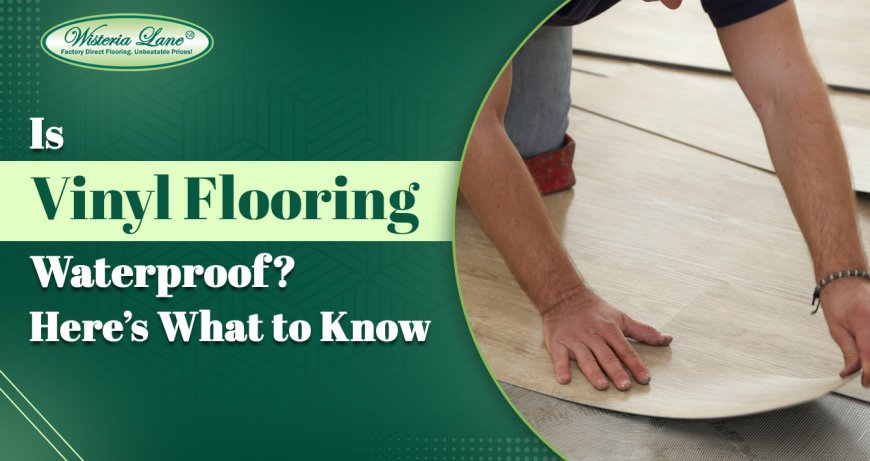Is Vinyl Flooring Waterproof? Here’s What to Know
Learn whether vinyl flooring is waterproof and if it's the right choice for your space. Find expert tips and pros & cons.

When it comes to choosing the right flooring for your home or commercial space, durability and water resistance are key factors—especially for areas like kitchens, bathrooms, and basements. Vinyl flooring has gained massive popularity over the past decade, but one of the most frequently asked questions is: Is vinyl flooring waterproof? The short answer is yes, but there’s more to understand about how it works, which types are best, and where to use them.
In this post, we’ll dive into everything you need to know about vinyl flooring, its waterproof qualities, and why it might be the perfect choice for your next flooring project.
Understanding Vinyl Flooring
Vinyl flooring is a synthetic flooring material made primarily from polyvinyl chloride (PVC). It comes in a variety of styles and formats, including:
-
Vinyl Plank Flooring (LVP): Mimics the look of hardwood.
-
Vinyl Tile Flooring (LVT): Resembles stone or ceramic tile.
-
Sheet Vinyl Flooring: Installed in large, continuous rolls.
Thanks to modern manufacturing techniques, vinyl flooring offers a realistic appearance with advanced texture, color, and grain patterns. But beyond its aesthetics, its functional properties make it a go-to choice for high-traffic and moisture-prone areas.
Is Vinyl Flooring Truly Waterproof?
Yes most modern vinyl flooring options are 100% waterproof.
This means that the material itself does not absorb water, making it ideal for environments where spills, moisture, or even standing water might occur. However, there are different levels of water resistance depending on the type and installation method:
1. Luxury Vinyl Planks (LVP) and Tiles (LVT)
These are typically waterproof by design. The core layer is either a rigid stone-plastic composite (SPC) or wood-plastic composite (WPC), both of which repel water. They are ideal for:
-
Bathrooms
-
Kitchens
-
Basements
-
Laundry rooms
2. Sheet Vinyl
Sheet vinyl offers excellent water resistance because it is installed as one continuous piece with minimal seams. This reduces the chances of water seeping underneath the floor.
3. Peel-and-Stick Vinyl
While often more affordable, peel-and-stick options may not be as waterproof as click-lock or glued vinyl. Water can seep through the seams if not properly sealed.
Waterproof vs. Water-Resistant Vinyl
It’s important to distinguish between waterproof and water-resistant:
-
Waterproof vinyl can withstand full submersion in water without damage.
-
Water-resistant vinyl can handle minor spills or humidity but may become damaged if exposed to large amounts of water over time.
Make sure to check product specifications and manufacturer labels to understand what you're purchasing.
How Vinyl Flooring Handles Moisture
One of the major benefits of vinyl flooring is that it's constructed in layers:
-
Wear Layer: A clear top coat that protects against scratches and stains.
-
Design Layer: The printed image that mimics wood, tile, or stone.
-
Core Layer: The waterproof or water-resistant core (SPC or WPC).
-
Backing Layer: Adds stability and can include underlayment for soundproofing or insulation.
These layers work together to create a barrier against moisture, preventing warping, buckling, or mold growth.
Benefits of Waterproof Vinyl Flooring
Here’s why waterproof vinyl is a favorite among homeowners and designers:
1. Ideal for High-Moisture Areas
Vinyl flooring pVinyl Flooringerforms well in bathrooms, laundry rooms, kitchens, and basements—areas traditionally at risk for water damage.
2. Easy Maintenance
Thanks to its waterproof qualities, vinyl flooring is incredibly easy to clean. Spills can be wiped up without worry, and no special cleaning solutions are needed.
3. Durability
Vinyl is resistant to scratches, dents, and wear, making it perfect for busy households with pets and kids.
4. Aesthetic Variety
Vinyl flooring comes in endless colors and designs that replicate high-end materials like hardwood and stone—without the high cost or maintenance.
5. Quick Installation
Many waterproof vinyl products use click-lock systems, which make installation fast and straightforward, even for DIYers.
Limitations to Consider
While vinyl flooring has a lot of advantages, it’s not without some drawbacks:
-
Not heat-resistant: Extended exposure to heat or direct sunlight can cause discoloration or expansion.
-
Non-biodegradable: Vinyl is made from plastic, so it’s not the most eco-friendly choice.
-
Can’t be refinished: Unlike hardwood, vinyl cannot be sanded or refinished once it’s worn out.
Still, for most use cases, especially in water-prone areas, the benefits far outweigh the limitations.
Installation Matters
Even if you purchase waterproof vinyl, improper installation can lead to water damage. Always make sure the subfloor is properly prepared—clean, level, and dry. Seams should be tightly sealed, and in some cases, a moisture barrier may be needed underneath the vinyl.
Professional installation is recommended for larger areas or commercial spaces to ensure maximum performance.
Conclusion: Is Vinyl Flooring Right for You?
If you’re looking for a flooring solution that can stand up to spills, humidity, and everyday wear and tear, vinyl flooring is an excellent waterproof option. Whether you’re renovating a bathroom, updating your kitchen, or finishing a basement, waterproof vinyl offers the perfect balance of style, function, and affordability.
Before purchasing, be sure to choose the right type of vinyl for your needs—LVP, LVT, or sheet vinyl—and always follow the manufacturer’s guidelines for installation and care.
At USFMHi, we provide expert advice, tips, and product recommendations to help you make the best decision for your space. Explore our vinyl flooring guides and let us help you transform your floors with confidence.
What's Your Reaction?
 Like
0
Like
0
 Dislike
0
Dislike
0
 Love
0
Love
0
 Funny
0
Funny
0
 Angry
0
Angry
0
 Sad
0
Sad
0
 Wow
0
Wow
0








































